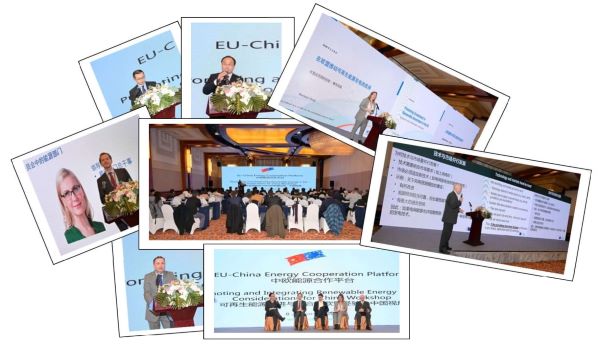
![]() Prof Shi Jingli opened the workshop with welcome remarks highlighting the win-win nature of EU-China’s cooperation with the hope that the ECECP platform will facilitate meaningful experience sharing, and thus enhance EU-China’s cooperation. Next, Octavian Stamate, Counsellor for Climate Action and Energy EU Delegation in China emphasised the timeliness of the subject in the light of the new European Green Deal, which aims to make Europe the first climate neutral continent by 2050. He further highlighted that as China and the EU are in the forefront of energy transition, it is of key importance to understand their pathways for sustainable and secure energy development. Following, Kong Tao from the Department of Renewables, National Energy Administration underscored the mutual learning potential between China and the EU, particularly in the design of the system blueprint, financing methods, regulatory framework, consumption mechanisms as well as cooperation in the off-shore wind and solar PV deployment sphere. The lessons from the dialogue will serve as a basis for ECECP’s upcoming annual reports.
Prof Shi Jingli opened the workshop with welcome remarks highlighting the win-win nature of EU-China’s cooperation with the hope that the ECECP platform will facilitate meaningful experience sharing, and thus enhance EU-China’s cooperation. Next, Octavian Stamate, Counsellor for Climate Action and Energy EU Delegation in China emphasised the timeliness of the subject in the light of the new European Green Deal, which aims to make Europe the first climate neutral continent by 2050. He further highlighted that as China and the EU are in the forefront of energy transition, it is of key importance to understand their pathways for sustainable and secure energy development. Following, Kong Tao from the Department of Renewables, National Energy Administration underscored the mutual learning potential between China and the EU, particularly in the design of the system blueprint, financing methods, regulatory framework, consumption mechanisms as well as cooperation in the off-shore wind and solar PV deployment sphere. The lessons from the dialogue will serve as a basis for ECECP’s upcoming annual reports.
Jan Steinkohl, Policy Officer at the Renewables Division of the Directorate-General Energy of the European Commission, started his presentation quoting Ursula von der Leyen, the new President of the European Commission: ’I want Europe to become the first climate-neutral continent’. He then briefly provided an overview of the EU’s support schemes for renewable energy, stating that finding the right level of support is increasingly important due to the growing competitiveness of some forms of renewable energy sources. Next, Mr Jan Steinkohl introduced the new legislative framework, which mandates a share of at least 32% renewable energy (not electricity) by 2030. This is set to raise public participation and facilitate investments as it provides stable and predictable conditions. Lastly, he gave an outlook of further increasing the targets under the new European Green Deal in the coming years, and that renewables for non-electricity sources and sector coupling will gain in importance.
Ms Monique Voogt from SQ Consulting discussed the market mechanisms and policy design of renewable energy deployment in the EU. As the power markets in the EU have experienced an increase in renewable energy investment and capacity, Ms. Monique Voogt identified the necessary policy frameworks and provided lessons based on case studies. By using the example of Germany, the Netherlands, Spain, and Denmark as four energy transition countries in the EU, she introduced best practices and lessons. Based on the case studies, she concluded that a clear formulation of goals is the prerequisite of an effective renewable energy policy, and the subsequent policy framework has to be designed in line with these goals. Additionally, the government has to control the level of financial support it provides in order to avoid excessive financing. Finally, a timely identification of barriers and main risks is necessary as well as ensuring high flexibility of the system.
In the afternoon, Roberto Lacal Arantegui, Scientific officer at the Renewable Energy Unit of the Joint Research Center of the EU, presented a comprehensive overview on the integration of renewable electricity in the European energy system. He pointed out that the integration of renewables requires a market transformation and a change in the mindset. While most actors are used to ensure the stable power supply from traditional power plants, it is important to build trust in the supply of renewable energy. On the policy side, consistent policies and ambitious long-term targets are necessary, while from the technological perspective, location-specific voltage regulation is needed to enable the integration of renewable energy. Overall, the three most important support elements for renewable electricity integration in the EU are:
- priority of dispatch for renewables;
- economic support policies, such as feed-in-tariffs and competitive auctions/tenders;
- progressively stricter grid codes that determine the technical specifications of electricity at the point of connection.
Furthermore, Mr Roberto Lacal Arantegui used the experiences of Spain and Ireland as examples to demonstrate that the integration of a high share of renewables is technically feasible even in island or peninsular environments. Ultimately, in order to overcome technical barriers, a proper market design and a strong political will are the most decisive factors.
Christian Romig, Head of Management Consulting at AFRY Consultancy, introduced the changes renewables have brought about in the EU power sector. These include renewable subsidy spending, cost reductions, change of the generation mix, carbon emissions reductions, and finally the disruption as well as innovation of the operational side of electricity markets. He further provided a detailed overview of support mechanisms, namely feed-in tariffs, premium feed-in tariffs including Contract for Difference (CfD), and green certificate schemes. The overall trend is to move towards a subsidy-free renewable space with the introduction of commercially driven renewables; however the trend may not be sustainable in the long run and new mechanisms need to be devised. Moreover, renewables have created new challenges, namely distorted electricity markets due to subsidies; and grid bottlenecks resulting into high curtailment rates. Ultimately, the renewable energy transition should be based on:
- ‘Three Ds’: decarbonisation, decentralisation, and digitalisation;
- ‘Five Cs’ commodity, capacity, capability, congestion, carbon;
- the fluctuations of supply and demand across time, space, and technology;
- Markets that deliver reliable operational and investment signals.
Lastly, the experts joined for a panel discussion titled Investing in Renewable Generation in the EU and China; Investors Perspectives.
Speakers’ Biographies

Roberto Lacal-Arantegui
Scientific Officer, Institute for Energy, Transport and Climate, Joint Research Centre, European Commission, The Netherlands
Roberto Lacal Arántegui is Scientific Officer at the Institute for Energy, Transport and Climate of the Joint Research Centre, European Commission. His work there, during the last seven years, is focused on techno-economic assessment of renewable energies and in particular of wind energy. He was responsible for launching the annual series of JRC wind status reports, focused on technological, market and economic aspects of wind power.
He has worked before in the air transport field, in air traffic control and management. In the field of energy, he worked in the former consultancy GfE Energy Management, whose Spanish branch he co-founded and where he became experienced in energy markets and energy efficiency in industry. At the European Commission, he has worked in the Impact Assessment of legislative proposals at DG TREN (now DG Energy).
Roberto holds a MSc in Renewable Energy and the Environment from the University of Reading, UK, and a BSc(H) from the Open University, also in the UK.

Monique Voogt
Managing Consultant, SQConsult
Monique Voogt has worked as a consultant in the field of sustainable energy and climate change since 1994, specialised in the design and implementation of energy and carbon market mechanisms.
She has worked with the European Commission, Development Banks and UN Bodies, as well as with NGOs and various multinational companies around the globe. Monique supported public clients in developing policy programs and legislation, including the European Energy Directive, the EU-ETS, voluntary agreements for industrial energy efficiency, green and white certificate systems, and NAMAs. She supports corporate clients in (re-) designing their corporate strategy in response to upcoming and expected legislative changes, and supports development of business propositions in energy and carbon markets. She has conducted various power market analyses (portfolio analysis, due diligence, strategy design and policy response) for several European energy companies.
Monique is a fast-thinker, analytical, open, down-to-earth, and a strong communicator. She knows how to motivate people and excels at building bridges between a diversity of people, disciplines, and ideas.

Jan Steinkohl
Policy Officer, Directorate General for Energy of the European Commission.
Working in the unit for renewables and CCS policy, Jan is part of the team that developed the Commission’s proposal for the recast of the Renewable Energy Directive in the Clean Energy for All Europeans Package. He mainly works on topics related consumers, such as self-consumption of renewable electricity and consumer information.

Christian Romig
Head of Management Consulting in China, AFRY Management Consulting
About AFRY Management Consulting
AFRY MBG Energy China team work closely with international utilities and investors to adapt to this rapidly changing environment; provide advice and strategies for Chinese energy firms building their presence overseas; and draw on AFRY’s extensive global expertise in designing energy markets and regulations to advise on China’s own energy transition.
- AFRY delivered its first consulting projects in China in the 1970s, has had a permanent presence in China since 2005, and now has 3 offices across the country with a multinational team of almost 100 professionals on the ground bringing together deep local sector knowledge.
- AFRY has advised most of China’s largest energy sector central state owned enterprises on issues ranging from strategy to overseas investment, including One Belt One Road projects.
- AFRY has helped major global energy firms enter the Chinese market, by providing cutting edge strategic advice to understand the fast-evolving and unfamiliar Chinese energy sector. Pöyry’s views are trusted, with experts in China who have experience advising the Chinese government on energy policies and market reforms.
AFRY also advises other stakeholders, including off-takers, policy makers, and regulators. Pöyry understands the challenges face by transmission/transportation system operators (TSOs) and provides strategic, commercial, technical and transaction advice through market insights and modelling, market design, regulatory strategy development and power system analysis. We formulate network development scenarios, provide asset management advice and enable investment decision-making. We support the innovative technological- economic development of TSOs from strategy to implementation.
AFRY’s particular expertise in renewable energy and energy markets includes:
- Revenue projections for renewable electricity projects, for use in investment appraisal models
- Commercial advice in relation to route-to-market, for example Power Purchase Agreements
- Insights into policy direction and regulatory risks relating to renewables
- Market strategy advice to renewables developers
- Market due diligence in relation to renewables transactions
- Operational excellence
- Implementation of European Network Codes and Guidelines (ENTSO-E and ENTSO-G) to integrate Regional EU-Markets, Ensure stable and reliable System Operation and Integrate renewable generation
- Power System development by applying innovative technologies such as dynamic line rating, multi-terminal HVDC connections, extra high voltage cable technology, onshore and offshore
- TSO-DSO cooperation and data management considering modern Smart grids, decentralised generation, electric vehicle charging, battery storage, demand-side management and other flexibility technologies
- System Congestion Management in the light of the energy transition, i.e. providing system adequacy and reserve power with regard to new market designs and long construction periods for new TSO network connections
- Operational and Organizational Excellence to align with the local regulatory and commercial frameworks and conditions
- Advice for matching ENTSO-E codes and standards for European TSOs
- Investment decision advice and risk analysis for large TSO investments
- Strategic Data management concepts for TSO
- More than 30 Regulatory, Commercial and Political quantitative analysis and modelling studies on European energy market and interconnector scenarios in the last three years
- Technical-economic studies and market analysis